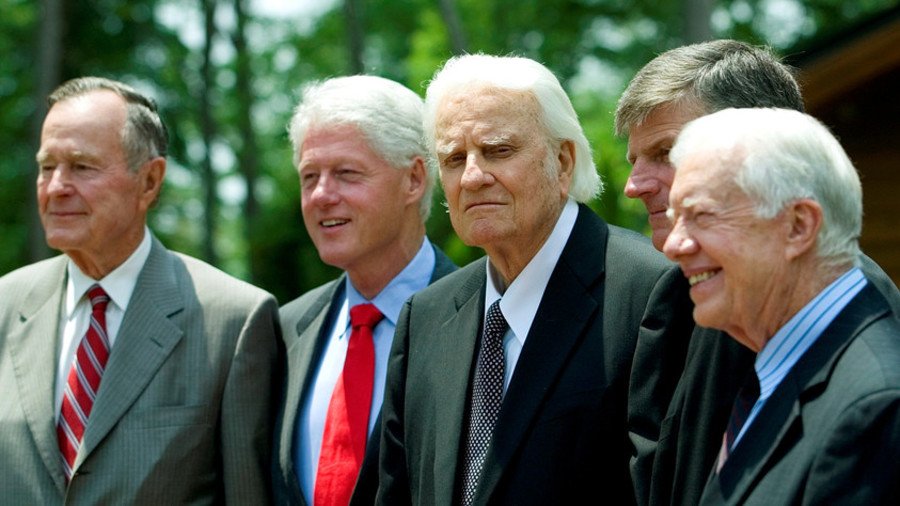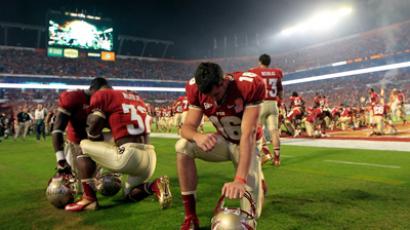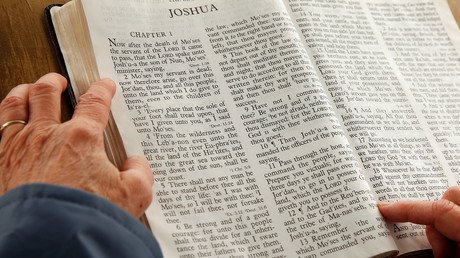Evangelical preacher Billy Graham, who brought God to TV and US politics, dies at 99

The most influential American preacher of the 20th century has died at the age of 99. Billy Graham advised 12 US presidents, brought evangelical Christianity to TV and politics, and helped forge the ‘ironclad’ US ties with Israel.
Graham was the spiritual adviser to almost all US presidents since Harry Truman. He was especially close to Dwight Eisenhower, Lyndon Johnson and Richard Nixon, and helped inspire the evangelical political activism that propelled Ronald Reagan into the White House.
“People in power have spiritual and personal needs like everyone else, and often they have no one to talk to,” Graham told Christianity Today in 2011,
Born in 1918, Graham became a devout Christian at the age of 16, having heard an evangelist at a local event. He was ordained as a minister in 1939. Known as ‘America’s Pastor,’ Graham’s sermons reached hundreds of millions of people in an estimated 185 countries. In 1952, Graham brought his ‘crusade’ to Washington, becoming the first to hold a formal religious service on the steps of Capitol Hill.
“If I could run for president of the United States today, on a platform of calling the people back to God, back to Christ, back to the Bible, I'd be elected,” he once remarked, according to author William Martin.
The GREAT Billy Graham is dead. There was nobody like him! He will be missed by Christians and all religions. A very special man.
— Donald J. Trump (@realDonaldTrump) February 21, 2018
Billy Graham's ministry for the gospel of Jesus Christ and his matchless voice changed the lives of millions. We mourn his passing but I know with absolute certainty that today he heard those words, "well done good and faithful servant." Thank you Billy Graham. God bless you(2/2)
— Vice President Mike Pence (@VP) February 21, 2018
Not all US presidents could count on Graham for support. Despite being registered as a Democrat at the time, the preacher was opposed to John F. Kennedy’s presidency and encouraged fellow religious leaders to speak out about the dangers of having a Catholic in the White House.
He was also a staunch anti-communist, calling on Truman to end Communism in North Korea and urging Nixon to bomb North Vietnamese infrastructure in 1969. At home, Graham championed the causes of civil rights and racial integration, posting bail to get the Rev. Dr. Martin Luther King Jr. out of a Birmingham, Alabama jail in 1963.
“Had it not been for the ministry of my good friend Dr. Billy Graham, my work in the Civil Rights Movement would not have been as successful as it has been,” King later said.
READ MORE: Good vs Evil: The false god guiding Western foreign policy
Graham was also influential in establishing the US evangelicals’ support for the state of Israel. Nixon even offered him the post of ambassador to Israel, but Graham declined the honor.
He was accused of anti-Semitism, however, when in 2002 the National Archives released the tapes of a 1972 meeting at the White House with Nixon and his chief of staff, H.R. Haldeman. At the meeting, Nixon and Graham expressed support for the Israelis but disdain for American Jews, whom Nixon blamed for dominating the news media and Graham accused of peddling pornography out of Hollywood.
“A lot of the Jews are great friends of mine,” Graham is recorded as saying. “Because they know I am friendly to Israel and so forth. They don’t know how I really feel about what they’re doing to this country.”
After the tapes were published, Graham issued an apology, saying he did not recall “having those feelings about any group, especially the Jews, and I certainly do not have them now.”
Nixon’s downfall in 1974 forced Graham to re-examine his involvement in politics and retreat from playing kingmaker back to simply providing spiritual guidance to US presidents.
“Evangelicals can’t be closely identified with any particular party or person. We have to stand in the middle, to preach to all the people, right and left,” Graham said in 1981. “I haven’t been faithful to my own advice in the past; I will in the future.”
He was not directly involved with the Moral Majority movement, started in 1979 by Jerry Falwell, which mobilized evangelicals politically to back Ronald Reagan. Yet the fact that Graham was friends with Reagan hardly harmed the former actor when he ran for the presidency.
“Ronald Reagan was one of the most winsome men I have ever known,” Graham wrote following the president's death in 2004.
Billy Graham was a humble servant who prayed for so many - and who, with wisdom and grace, gave hope and guidance to generations of Americans.
— Barack Obama (@BarackObama) February 21, 2018
Billy Graham lived his faith fully, and his powerful words and the conviction they carried touched countless hearts and minds. https://t.co/b4QaPyFlP0
— Bill Clinton (@BillClinton) February 21, 2018
Graham spoke at graveside services for both Lyndon Johnson and Richard Nixon. Following the September 11, 2001 attacks, he led a mournful America in a national prayer service.
He also continued to believe that homosexuality was a “sinister form of perversion,” with his ministry taking out newspaper ads to oppose the legalization of same-sex marriage. After the US Supreme Court 2015 ruling in Obergefell v. Hodges, his son Franklin Graham said that he hoped “God will spare America from His judgment, though, by our actions as a nation, we give Him less and less reason to do so.”
Billy Graham was diagnosed with Parkinson's disease in 1992, and went on to battle cancer and pneumonia before his death.














